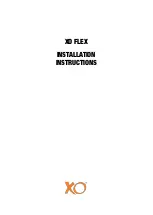
35
Space HMI and Remote Room Sensor Installation
Space HMI faceplate(s) (refer to
Figure 28
), remote room sensors (refer to
page 11
page 14
and smart controls may be ordered and shipped separately. These components measure temperature and assist in
controlling the unit. These components should be installed in a safe location, free of influence from external heat sources.
Install sensors in areas indicative of the average room temperature, and away from heat-producing appliances. HMIs and
remote room sensors can be installed directly to industry-standard junction boxes, either surface mounted or recessed
mounted. HMIs have a built-in temperature/relative humidity (RH) sensor, which is typically used to help control the
automatic function of the unit.
The HMI can also be configured to control the unit from a remote location manually. They can be configured not to use the
internal temperature/relative humidity sensor. In this configuration, the sensor in the HMI is ignored in automatic
operation. Multiple HMIs can be connected to one unit for temperature and R/H averaging. All combination
temperature/humidity HMIs will use a vented standoff. Mount the static pressure tube close to the HMI to obtain proper
room conditions.
A max of 4 additional HMIs can be daisy-chained together. Place an End-of-Line (EOL) device in the last HMI connected.
Figure 28. Space HMI Installation
Summary of Contents for RTULink
Page 2: ...2...
Page 30: ...30 Main Board HMI Menu Tree...
Page 31: ...31...
Page 32: ...32...
Page 33: ...33...
Page 34: ...34...
Page 41: ...41...
Page 42: ...42...
Page 43: ...43...
Page 44: ...44...
Page 52: ...52 APPENDIX C Fixed Dry Bulb Economizer Figure 34 Fixed Dry Bulb Economizer Operation...
Page 53: ...53 Differential Dry Bulb Economizer Figure 35 Differential Dry Bulb Economizer Operation...
Page 54: ...54 Fixed Enthalpy Economizer Figure 36 Fixed Enthalpy Economizer Operation...
Page 55: ...55 Differential Enthalpy Economizer Figure 37 Differential Enthalpy Economizer Operation...
















































